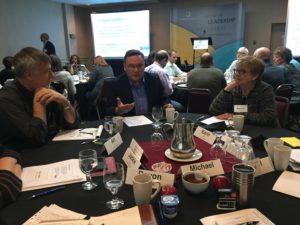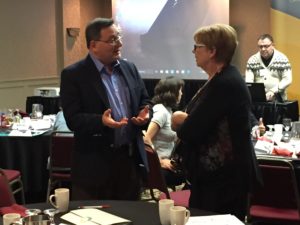|
Getting your Trinity Audio player ready...
|
Trust and communication.
These two simple words took on a new meaning for the board leaders and top administrators in the charitable non-profit sector who took part in Capacity Canada’s recent Manulife Board Governance BootCamp thanks to its keynote speaker, Wayne D. Garnons-Williams.
The renowned Canadian lawyer, tribal judge and business leader helped kick off the two-day event (Nov. 16-18) at the Holiday Inn Kitchener-Waterloo Conference Center. Sponsored by Manulife and led by Capacity Canada facilitators, the BootCamp helped those leading in the non-profit sector to better understand their roles through the use of shared information and intense discussion surrounding board governance.
Garnons-Williams spoke from the heart at the opening reception, attended by about 125 people including previous BootCamp participants, sharing deeply personal stories which stressed the importance of trust and communication.
“That’s a resonating theme throughout the BootCamp,” he said in an interview after participating in the BootCamp. “It’s the intangible aspects of leadership and governance and the fact that a lot of governance issues, when you come right down to it, deal with human interaction.”
The term ‘human’ is the best way to describe how Garnons-Williams reached out to participants by sharing personal stories about his life and impressive legal career.
Garnons-Williams was appointed in 2012 as Tribunal Chair of the Federation of Saskatchewan Indian Nations and is the founding head of the International Inter-Tribal and Investment Group. He has held various federal executive and legal positions, including as Director for Resolutions, Indian Residential Schools Resolutions Canada and Registrar of the Federal Court of Canada.
However, his beginnings were much more humble. Born on the Moosomin First Nation, Treaty 6 territory in Saskatchewan, Garnons-Williams was quite candid as he described being part of the ‘Sixties Scoop’ – a dark period in the 1960s in which the children of Aboriginal peoples in Canada were ‘scooped up’ by the government to be adopted, or fostered, by primarily white middle-class families.
“My mother was given a ‘Sophie’s Choice’,” said Garnons-Williams, explaining how the young unmarried woman was forced to select one of her two children to be put up for adoption. “My mom chose me and she lived with that guilt for most of her life.”

However, he said reconnecting with his birth family wasn’t easy and admitted the first contact he had with another Indigenous person as a child was seeing an intoxicated man on the street. “I remember feeling very ashamed,” he said of that experience.
Even as his legal career took off, Garnons-Williams said the connection with his birth family, particularly his grandfather, was never that solid as he grew into adulthood.
“We came from two different worlds,” he said, referring to his birth family. “The gap was too huge.”
Garnons-Williams also faced adversity in his personal life, particularly around his relationship with his first wife and her family.
“Her parents disliked me because I looked like an Indian,” he said bluntly.
After his ex-wife was involved in two serious car crashes, Garnons-Williams said the marriage suffered due to a variety of her injuries which resulted in personality changes.
“I was more of a parent to my wife rather than a husband,” he said. “The trust and communication between my wife and me was gone.”
And as child custody battle ensued, Garnons-Williams said his professional life also greatly suffered until he found renewed personal energy in helping Canada’s Indigenous peoples develop their own economy.
He also made peace with his past and told BootCamp participants how he reconciled with his birth mom.
“I told her ‘It’s not your fault’ and that I still loved her,” Garnons-Williams said, choking back tears. “I told my adoptive mom the same thing and now I’m blessed with two moms.”
He said trust and communication have played roles in his successes.
“One must earn trust. It is never given freely,” he told participants.
Garnons-Williams described later in an interview how human emotions and personal interests can create conflict in the operation of non-profit organizations, despite how smooth things may appear on paper.
“There are ripples that need to be ironed out through good communication and that communication establishes the relationships which build trust,” he said. “Which then allow one to make a leap of faith with respect to an activity shared between two organizations, or two divisions of an organization so that you know this person and have fully communicated about the objectives and needs of both sides, so you trust them to lead on your behalf.”

